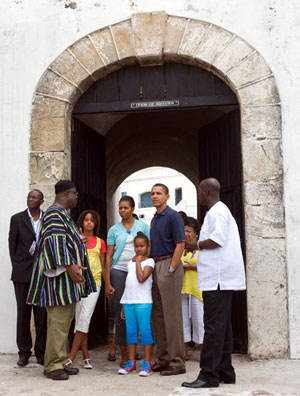Back through the ‘door of no return' - Obama in Africa
By Richard B. MuhammadEditor-In-Chief | Last updated: Jul 16, 2009 - 8:06:25 PM
What's your opinion on this article?

U.S. President Barack Obama, First Lady Michelle Obama and daughters Sasha and Malia stand in ‘the Door of No Return' during a tour of Cape Coast Castle, a former slavery outpost, in Cape Coast, Ghana, on July 11. Photo: SAID KHATIB/AFP/Getty Images
|
With a guide pointing out the history and the sections of the castle, with its dungeons, cannon turrets and white-washed walls, the Obamas' were able to hear about and pay homage to those ripped from Africa and scattered throughout the Diaspora.
“One of the most striking things that I heard was that right above the dungeons in which male captives were kept was a church, and that reminds us that sometimes we can tolerate and stand by great evil even as we think that we are doing good,” said President Obama in brief remarks after the July 11 tour.
President Obama told the media the trip was especially important for his daughters, Malia and Sasha, to see and learn lessons from history and heighten “their sense of obligation to fight oppression and cruelty wherever it appears. And any group of people who are degrading another group of people have to be fought with whatever tools we have available to us. Obviously it's a moving experience, a moving moment,” said the president.
“It has to teach all of us that we have to do all we can to fight against the kinds of evils that sadly still exist in our world, not only on this continent, but in every corner of the globe.
African Americans obviously there is a special sense on the one hand this place was place of profound sadness, on the other hand, it was here where the journey of much of the African American experience began,” he said. To see the portal where the Diaspora began, visit with the people of Ghana and celebrate progress as Blacks and Whites fought to end slavery, and win civil rights for all people “reminds us as bad as history can be, it is also possible to overcome,” said Mr. Obama. He also thanked the people of Ghana for preserving the slave castles and organizers of his trip for the invitation to visit. The president unveiled a plaque to mark his sojourn.
The first couple received traditional African names, were presented with honorary doctorate degrees from the University of Cape Coast, and Mr. Obama was offered land to develop. The street in front of the castle was renamed in his honor. A traditional leader “bestowed on the fi rst couple of the U.S.A. the titles, Okukurdofo Kofi Obiekwan and Obatan Efua Nyamekye,” the Daily Graphic reported July 13.

|
|
‘Cape Coast castle dungeon is one of the great symbols of African enslavement and is a documentation for reparations.’ —Dr. Leonard Jeffries, City Colleges of New York |
“Cape Coast was built by the Swedes and taken over by the British in the 1660s and became their base for enslaving on the coast of Africa for several hundred years, eight miles away at Elmina Castle dungeon started by the Portuguese in 1482. In the 1630s the Dutch and the English allied to try to take the slave system away from the Catholic nations of Spain and Portugal,” he said.
The Dutch took control of Elmina in 1637, and these Protestant nations emerged as powers and used their power to control the slave system, Dr. Jeffries explained. The captured Africans were taken across the Atlantic Ocean, “the greatest graveyard in the history of the world,” and into the Western world.
“Most of the people who come through don't have time to visit the slave dungeons. They may make a ceremonial presentation at the airport, or even in a square in Accra, Black Star Square. Some may go to Christianbourg Castle dungeon, which was the Danish headquarters, but it's the state house. But it is rare for someone to go out of his way to accept the invitation to go into the slave dungeons. We have to, as African peoples, understand what slavery was, how it lasted from 1482. In Brazil it lasted into the 1880s,” Dr. Jeffries said. Then there is the post slavery impact of colonialism and neo-colonialism, which raped the continent, he said. Reparations have to be discussed, said the respected author and researcher.
“Certainly if we don't get a dime we have to know we are not debtors and people owe us for hundreds of years of exploitation and genocide really,” Dr. Jeffries said. “If we only get internal reparations, how we manage our world, how we manage our wealth, how we manage our resources. If we give ourselves internal reparations, we'll move a long way towards development of African people.”
Related stories:
Obama in Africa (FCN, 07-14-2009)
Slavery apology resolution passes U.S. Senate (FCN, 07-03-2009)
INSIDE STORIES AND REVIEWS
-
-
About Harriett ... and the Negro Hollywood Road Show
By Rabiah Muhammad, Guest Columnist » Full Story -
Skepticism greets Jay-Z, NFL talk of inspiring change
By Bryan 18X Crawford and Richard B. Muhammad The Final Call Newspaper @TheFinalCall » Full Story -
The painful problem of Black girls and suicide
By Charlene Muhammad -National Correspondent- » Full Story -
Exploitation of Innocence - Report: Perceptions, policies hurting Black girls
By Charlene Muhammad -National Correspondent- » Full Story -
Big Ballin: Big ideas fuel a father’s Big Baller Brand and brash business sense
By Bryan Crawford -Contributing Writer- » Full Story






 Click Here Stay Connected!
Click Here Stay Connected!








